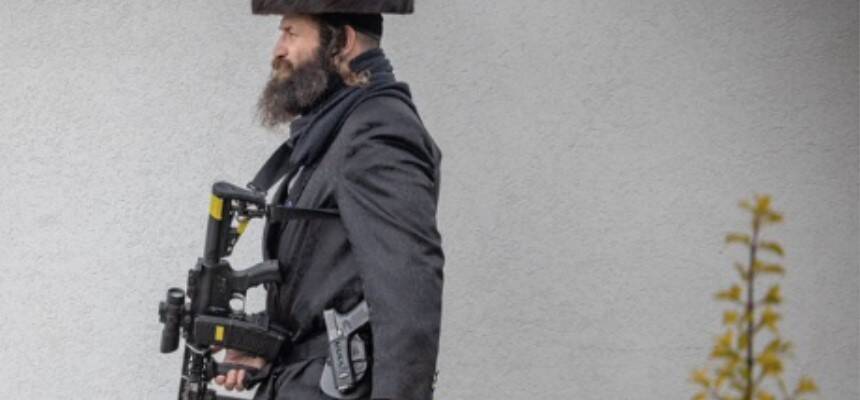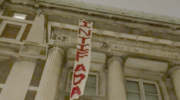‘If we are not unified as a people and as a nation, there will be nothing left.’
By Etgar Lefkovits, JNS
With an M16 over his shoulder and a pistol and walkie-talkie at his waist, his long black coat and fur hat worn by some Hassidic Jews in place, Asaf Peleg turns heads as he makes his way to the synagogue and to take his daily ritual bath.
The heavily-armed former commando-turned-hassid/synagogue leader is an unusual sight in a country that has seen much secular-religious tension over the failure of the great majority of ultra-Orthodox men to serve in the military with the rest of society.
He is now the head of local security in this southern city.
“At first people thought I was crazy,” Peleg, 44, concedes to JNS in an interview. “Then they realized that there was something more: that I cared and had capabilities.”
More than anything else, the maverick synagogue congregation leader serves as a bridge builder in a nation long polarized that is united anew by the four-month-old war against Hamas in Gaza.

Asaf Peleg.
Military background
Peleg’s unconventional journey through life began in a “strictly secular” household in an agricultural community in central Israel, born into a family with a strong tradition of military service who were also involved in the establishment of the Mossad spy agency.
“From age zero you knew that you were going to the military,” he said. “It didn’t matter what you did as a kid, the greatest desire was to get to the highest point in the military.”
When he was 16, his parents left Kibbutz Givat Haim Meuhad near the city of Hadera, but the teenager didn’t want to move so he stayed behind and lived with his grandfather, a Holocaust survivor and former partisan who was born in Hungary.
Two years later, Peleg enlisted in the IDF, in the crack Duvdevan undercover commando unit, one of the toughest special operations forces in the Israeli army, where he rose to squad commander during his five-year service.
After his military service, which included an arrest operation in Hebron where he almost died, Peleg, like many of his comrades, bought an open one-year ticket to Thailand. He dyed his hair blonde and tattooed his shoulder with a wolf howling at the moon.
Spiritual awakening
Traveling alone but finding friends in the Far East, the then-23-year-old Peleg was sure he would return to Israel and enlist in the Shin Bet or the Border Police’s Yamam National Counter-Terror Unit.
Another near-death experience with an Israeli friend who got height sickness while climbing the Himalayas and required emergency evacuation set him off on another trajectory of life.
“Now you were alone in the Himalayas, you were no longer in the army and you were a civilian,” he recounts.
After that incident, he drove a motorcycle for four hours from Nepal to India to join friends for a Passover seder when, alone in nature during the ride, he began to reflect on his life.
“There and then my whole life view changed,” he says. “I realized that there was a whole life that I had avoided up until this point.”
Peleg decided not to enlist in the security services and continued his travels, taking up yoga and, with no religious background, finding himself drawn to the Judaism he had not known.
He returned to Israel, ”dressed like Buddha,” so much so that when he got off the plane shirtless, bracelets on his arm, a blonde ponytail and less brawny than when he set out after the army, his parents did not recognize him.
Closer to Judaism
His travels through nature, with no stops at Chabad, somehow awoke in him a connection to Judaism, which he first encountered through reading the Song of Songs after perusing through a book his older brother, who also turned religious, had given him for his travels. (His younger brother leads a secular lifestyle.)
On his return to Israel, the guitar-playing Peleg met his future wife at a friend’s party at a coastal community of youngsters and young families; she was also becoming religious after a trip to the Far East.
“I felt the life I lived before was not good for me, and that Judaism brought me closer to the person I wanted to be,“ he said.
After four dates, they married and had seven children. Peleg would go on to become a (non-ordained) community congregation leader and work as a security officer in the ultra-Orthodox city of Bnei Brak while heading a local nonprofit for volunteerism among secular and religious that he set up six years ago.
Bridge for unity
Six months ago, the family moved to Kiryat Malachi, where, in the wake of the Oct. 7 massacre, he was charged with establishing the rapid response team, which had proven so critical in the area. He was given a security position due to his commando background.
“Everybody should do their part and we all need to stand shoulder to shoulder,” he said.
Peleg teaches his children self-defense and says it will be up to them whether they enlist in the IDF.
Locals have grown accustomed to seeing him in full ultra-Orthodox garb with weapons at his side on Shabbat (on weekdays he wears a sweatshirt) and feel safe when he is around.
More than anything else, Peleg said that the poisonous polarization that divided Israeli society before the Hamas attack must never return or the existence of the state will be in peril.
“It’s high time that we find that which binds us, because we always can find what to fight about,” he said, adding that the murderous Hamas attack offered Israel a new opportunity.
“If we are not unified as a people and as a nation there will be nothing left,” he said.
MAKE THE LAND OF ISRAEL EVEN MORE BEAUTIFUL!
PLANT YOUR VERY OWN FRUIT TREES IN ISRAEL!
Farmers near the Gaza border lost family, friends and workers. Spring is here, and they desperately need help to replant the farms. Join us in blessing the People and Land of Israel.
“I will ordain My blessing for you…” (Leviticus 25:4)























